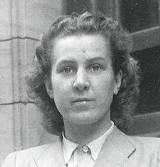
Traudl Junge
Traudl Junge was Adolf Hitler's private secretary from 1942 to 1945.
Unsourced
- We should listen to the voice of conscience. It does not take nearly as much courage as one might think to admit to our mistakes and learn from them. Human beings are in this world to learn and to change themselves in learning.
- Of course, the terrible things I heard from the Nuremberg Trials, about the six million Jews and the people from other races who were killed, were facts that shocked me deeply. But I wasn't able to see the connection with my own past. I was satisfied that I wasn't personally to blame and that I hadn't known about those things. I wasn't aware of the extent. But one day I went past the memorial plaque which had been put up for Sophie Scholl in Franz Josef Strasse, and I saw that she was born the same year as me, and she was executed the same year I started working for Hitler. And at that moment I actually sensed that it was no excuse to be young, and that it would have been possible to find things out.
- I was 22 and I didn't know anything about politics, it didn't interest me.
- I admit, I was fascinated by Adolf Hitler. He was a pleasant boss and a fatherly friend. I deliberately ignored all the warning voices inside me and enjoyed the time by his side almost until the bitter end. It wasn't what he said, but the way he said things and how he did things.
- Something like [the Holocaust] can only happen when a dictator is so well organised that he controls the entire system. And organising is something that the Germans can do.
- Suddenly there is the sound of a shot, so loud, so close that we all fall silent. It echoes on through all the rooms. "That was a direct hit," cried Helmut [Goebbels] with no idea how right he is. The Fuhrer is dead now.
- [when asked "And what about the conscience of the humans?"] You see, that is a point where Hitler did a lot of damage. He tried to manipulate the conscience of the Germans. He talked them into the act that they should exterminate the Jews because they were the cause of misfortune. That was originally not Hitler's idea but a lot older. It was a sacrifice that they should bring. And I remember a female writer that interviewed a campguard and asked him if he didn't feel sorry for the people he mistreated. He answered "Yes, for certain I feel sorry for them, but it is something that I should bear. It is a sacrifice that I should bring for a higher purpose." And there is the conscience again. Hitler has always said: "dont worry about it, just do what I tell you. I bear responsibility." As if you can take away the responsibility of someone else! And I believe now that you can stimulate your conscience, help it fall asleep, and manipulate it.
